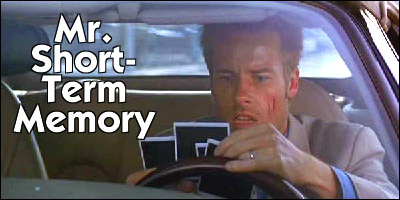

Memento #12 (chronologically) in Mike D'Angelo's list of twelve films to which he would give a score of 100 out of 100.
Premise
Reaction At least I'm not alone in being bewildered by this. When I looked back at my first article on Memento I expected it to suck, but it was better than I thought. The point about how the protagonist watches the world the way we watch puzzle movies is reasonably well-observed. And I was correct that the filmmakers demonstrate no inclination to try to turn their chess pieces into actual people. But while the movie is pretty feeble as a character study, I didn't realize on my first viewing how strong it is existentially. I thought that it was demonstrating how important memory was to the human condition by showing what it's like to have it taken away. But nowadays I suspect that this is not the case — that the guy with the brain damage is there to serve less as a contrast than as a metaphor. They say that memory is the first thing to go. Up until around the time I turned thirty, I could actually argue (as I did in the first article) that our sense of self relies on our ability to construct a coherent narrative of our lives as a solid chain from the beginning right up to the present. After all, I could; I could even datestamp everything. But not anymore. I have gone from being the one who quotes old conversations back at people to the one saying, "Buh? I don't remember that at all" when Elizabeth tells me about things I said last week. When I was in college, I rarely took notes because I remembered everything; now when I audit classes I fill up notebooks from front to back, and when I go back and read them, it's like taking the class all over again — I retain maybe 25%. I've found myself wondering how it is that the 2000s have managed to just fly right by me. For a while I thought it might be because a smaller percentage of my life has unfolded each year: the interminable 1980s took 63% of my life to get through, while the 2000s to date have breezed by in a mere 24%. But now I think it has more to do with the fact that I'm just plain registering less of each passing year. Instead of a voluminous chronicle to show for my decade I've got a little gift basket of representative moments. I was also mistaken to think that having a sense of the story of your life is fundamental to one's sense of self. Note that above I said that our inner narratives ran "from the beginning" — but how far back do most people's memories really go? I was born in 1974, and even back when my memory was sharper, the entire rest of the 1970s only yielded a few dozen memories total. (Of course, there are plenty of people who were adults in the 1970s who can say the same thing.) How many people remember much of anything that happened to them before about the age of two, or even five? And yet isn't most of our character set by two, and almost all of it by five? Any psychiatrist can undoubtedly bury you in files describing patients who picked up dysfunctional patterns long before their memories begin. So when the protagonist of Memento says that he can't remember anything for more than a moment, but that he can still learn through conditioning — that's not too far removed from the experience of those of us whose hippocampi still work. This is the last of the Mike D'Angelo Dozen, and after watching this, and Exotica, and Primer (his #2 movie of 2004), and similar selections of his, it's pretty clear to me that he has a weakness for puzzle movies — when they have any thematic weight whatsoever, he pays extra close attention. I have a similar weakness for superhero comics, so on this viewing of Memento I found myself reminded of Forever, the seventh volume of Powers. Forever is about a couple of immortals, millions of years old, who carry on a vendetta spanning the millennia... but while their bodies are ageless and invulnerable, their minds can only hold enough memories for an average human lifetime. Each of them remembers only the last few decades. They often even forget each other. But when they see each other, it triggers a reflex: they remember that they hate each other, and that it's for something that one of them did to the other... they just don't recall quite what. But it doesn't matter. And it occurred to me that this is a parable for any kind of multigenerational conflict. In the 1990s you had people in the former Yugoslavia slaughtering each other over something that happened in 1349. No one on either end of the massacres remembered what, because no one involved was 650 years old. But they knew they hated each other, because they'd been conditioned to, and because, like the guy in Memento, they'd consulted little notes — history books. And as Stalin showed, if you take the liberty of rewriting a few of those notes, and eliminate those who remember the real story...
Return to the Calendar page! |
